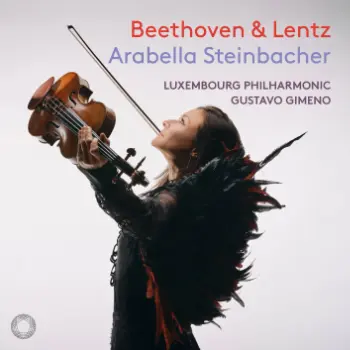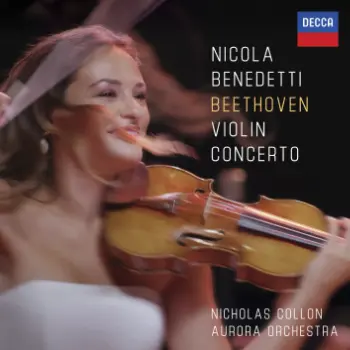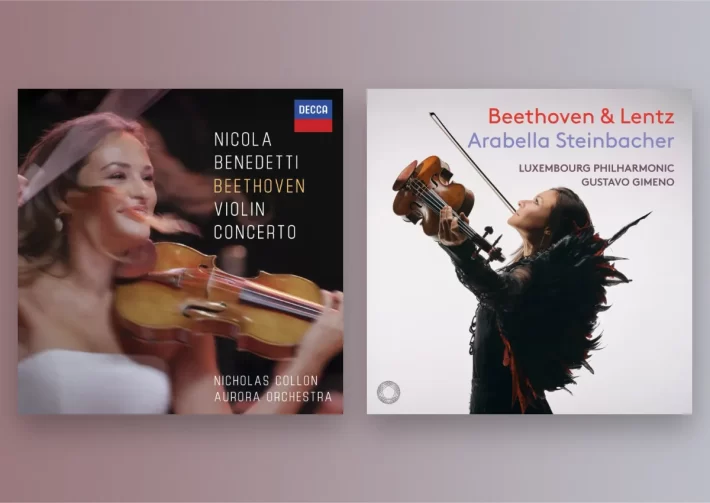This is Steinbacher’s second recording of Beethoven’s Violin Concerto. Her 2009 recording, with the WDR Sinfonieorchester Köln and Andris Nelsons (Orfeo), is an overly slow 48 minutes. This new reading is roughly three minutes faster, but the opening movement again feels too slow. The issue is not really tempo, but rather momentum, that is, the lack of it. The performance never feels like progression toward a harmonic/emotional goal. Instead, it carefully moves from section to section (though each presented in undeniably pristine, richly upholstered condition). It lacks the sense of symphonic sweep felt so powerfully in readings by Tetzlaff , Faust, and Jensen.

The Larghetto is about a minute faster, and much better for it. Steinbacher’s luxuriant colorings and subtle phrasing impart a satisfying Romantic ardor. The Rondo, about 30 seconds faster than in Köln, is rapturous, and she unearths more playfulness this time around. The cadenzas, especially the one for the third movement, are dazzling.
Whereas that first album included an anguished performance of Berg’s concerto, this Pentatone release features the premiere recording of Georges Lentz’s ‘…to beam in distant heavens…’ concerto, written for Steinbacher. In an introductory note, Steinbacher states that the music contrasts “the destructive nature of power, hatred and despair, and on the other hand — complete love…” The composer writes that he was also inspired by the poetry of William Blake, and fear that a future generation will one day look back in sadness at how we destroyed our planet (a sentiment movingly conveyed in track 8, “An Elegy for our Grandchildren’s Planet”).
Lentz’s dramatically gripping writing matches these weighty, visceral points of inspiration. The percussion section gets a workout, its bass drum thwacks having plenty of physical oomph in Pentatone’s state of the art recording – hear how the opening, which is played by the soloist backstage, is perfectly balanced as such by the engineering.
Steinbacher dispatches the heavy demands of the solo part with astonishing ease. The raging final Coda proves both physically thrilling and emotionally ambiguous, just as the composer intends. Gustavo Gimeno and the Luxembourg Philharmonic play with evident enthusiasm and drive, presenting the best possible case for this impressive new work.
Beethoven by Memory
Benedetti’s Beethoven, in which she eschews displays of virtuosic showmanship for a first among equals approach, is far more satisfying. The Aurora Orchestra performs by memory because, as Principal Conductor Nicholas Collon explains, “Memorizing deepens and enriches our relationship with the music in every way.” I did not anticipate this approach would significantly affect an audio release, but I was wrong.

The accompaniment is shaped with considerable care: memorizing surely requires considering each line and its role, both within the accompaniment and in relation to the soloist. If this puts the accompaniment and solo on the same plane, it is an approach that aligns perfectly with Benedetti’s self-effacing interpretation.
Benedetti demonstrates impressive dynamic control and a silvery range of colors. Front and center for the concerto’s big moments, she often steps back, adopting a slimmer tone to converse with the ensemble (especially in the second movement, which has a rarefied atmosphere in which time seems to stand still). Admittedly, some listeners will find this disconcerting. Benedetti is undeniably more restrained when compared to the more overt virtuosity of Janine Jansen (Decca) and Patricia Kopatchinskaja (Naïve), But I found her approach compelling.
The first movement’s cadenza is a marvelous reworking of Beethoven’s own arrangement of this Violin Concerto when he adapted it into a Piano Concerto (the same idea for this cadenza was explored by Gidon Kremer and Kopatchinskaja). The Rondo has toe-tapping joy; its cadenza, credited to Benedetti and Marsalis, is the showiest moment of the entire performance.
Decca’s intimate recording suits the performance perfectly. The 42-minute playing time is stingy (I would have welcomed hearing these same performers in the two Romances), especially compared to 80 minutes of music on Steinbacher’s new album. Nonetheless, if choosing between these two Beethoven performances, Benedetti’s is the one to own.

Album Details |
|
|---|---|
| Album name | Beethoven & Lentz |
| Label | Pentatone |
| Catalogue No. | 5187240 |
| Artists | Arabella Steinbacher, Luxembourg Philharmonic Orchestra, Gustavo Gimeno |

Album Details |
|
|---|---|
| Album name | Beethoven – Violin Concerto |
| Label | Decca |
| Catalogue No. | 4871016 |
| Artists | Nicola Benedetti, Aurora Orchestra, Nicholas Collon |



















